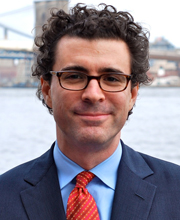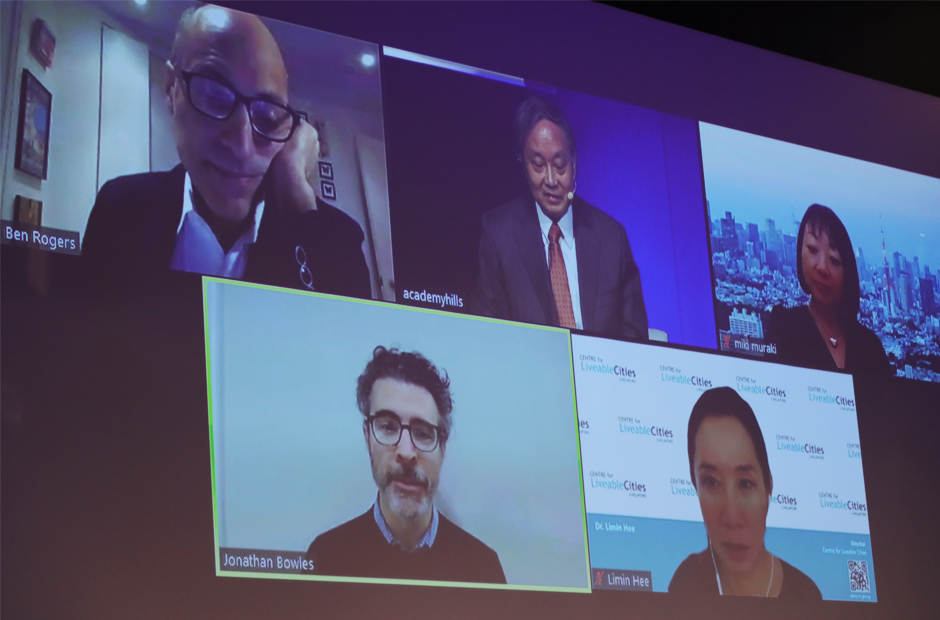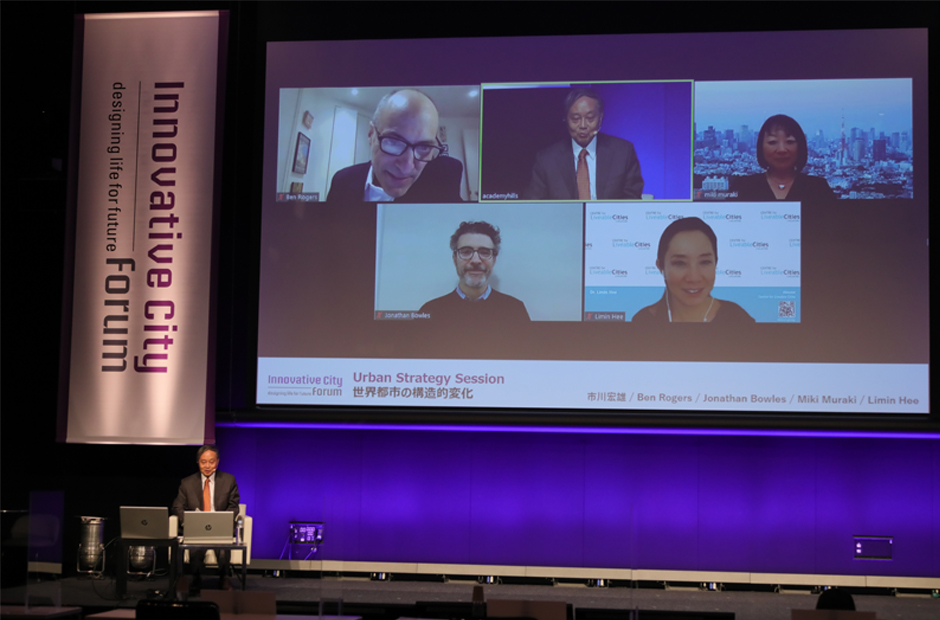Structural Changes in World Cities: What constitutes a fascinating city in the post-COVID-19 era? Part 3 Panel Discussion
Roppongi Academyhills Towerhall


(former Director of Centre for London)



**Please note that following presentations were made based on information as of Nov. 2020, and some information might have been updated or altered since then.
Panel Discussion
Ichikawa
It was revealed that each of the four cities is dealing with issues in various ways. Following this pandemic, we will undoubtedly experience some changes in the way that we live and work. Considering such a situation, where should we focus our thoughts?
Question 1:How would changes in lifestyles and workstyles affect or transform major global cities in general, such as London, New York City, Singapore and Tokyo, and how might this redefine their “Competitiveness” ?

Ichikawa
As cities around the world adjust their working and living styles as a direct result of this pandemic, what kind of power and competitiveness should global cities have and are they able to have? I would like to hear your opinions.
Ben Rogers
I think there will be two big changes.
One, I hope will be a bit more willing to embrace the importance of creating a city which can adapt to the unexpected, and a city which puts resilience thinking at the heart of its planning, which we haven't really done very much in London. I am hoping that COVID would change that mindset and will help prepare us as well for climate change.
Two, I think and I hope that we will see the end of a slightly thoughtless automatic office culture where you are just expected to go to work every day, even when you could work from home. That is a very, very inefficient way of doing things. It puts huge pressures on space, on the transport system. I completely believe that you do need face-to-face contact and that is the most productive way of running businesses and enterprises and learning. But I don't think you need it in the sustained way that we had it before.
So I'd like to see a world where city centers in particular move up the value curve so that they are not there just for routine work and routine meetings, they are there for those special moments where you really need to be with somebody, whether it's to see a performance or to have a meeting or because you are a young worker and you want to learn and need to learn from your peers and from your superiors.
Jonathan Bowles
I would agree with Ben that one of the things that concerns me the most about is the movement of remote work. I don't know if we'll see everybody continue to work from home, since it's easier said than done. I think there are a lot of challenges with working from home, that people are in many ways itching to get back in their company offices. Some people have found that working at home in small cramped apartments is inconvenient after a while.
But I do think we are going to see more of a move towards more of a neighborhood or satellite-based office culture, which could have a major impact on the centers of cities, so places like midtown in Manhattan, whereas Ben was talking in his opening presentation about the center of London. We've already seen that in New York and it's had an impact. As fewer office workers have gone into Midtown Manhattan, we've seen a kind of a secondary impact on all sorts of other services businesses. People that had gone after work for a drink or people who had gone for lunch at a restaurant nearby, and those type of businesses employed a lot of people, particularly the workers without college education.
Also I think the biggest threat is really if this expands more than we even think. Because what's made cities like New York and London so fascinating but so competitive has been the proximity. Companies have moved to New York despite enormous real estate costs and high taxes, but they come because the talent is here. If the talent can be used remotely from anywhere, I am not sure that as many companies will be here or they will put as many jobs here and that is a real risk for cities.
What can cities like New York and others do? I think we have to focus on what got us here in the first place. We got to focus on the things that made New York and other cities attractive things, like culture, nightlife, vibrant street life, being a walkable city. Most of the other parts of the United States don't have those things and that is why so many people came to New York. And I think that cities like New York have got to continue to focus on those things so that even amidst all these changes, we continue to attract the talent.
Miki Muraki
As for what is required of a global city, I also believe that culture, transportation, environment, liveliness, entertainment, etc. are important. In addition, I also feel that what we need to consider in a new way due to COVID-19 is the element of flexibility.
Taking the flexibility of the working place as an example, it is gradually becoming clear that the places suitable for work differ greatly depending on the type of industry. In the future, we will have to give more consideration as to what type of industry is suitable for working from home and what kind of business can be done regardless of location, and respond with flexibility. In order to achieve such flexibility, it is essential we examine how to ensure access to digital information, as well as how to protect the security of the information.
On the other hand, I also recognize the importance of face-to-face communication in every industry, so I think that the emphasis on such areas will continue to exist in large cities.
Limin Hee
I would like to elaborate on three points to answer your question.
First of all, we need to see new forms of 3Ps-collaboration between the public, private, and people sector; in other words, to take a whole-of-society approach. Many solutions needed to overcome the pandemic and to live with the virus require taking an integrated approach. This means that a lot more collaboration has to take place between these sectors.
Number two, is about leveraging on technology. As you can see, in Singapore, we had built up our digital infrastructure to allow us to work from home as well as to do home-based learning. This is very important for the city to adapt and to leverage on the most advanced technology to help us. Even in CLC’s work, we have been able to switch from lectures to webinars, and now have meetings and collaborative workshop through internet platforms like Zoom.
Number three, is that we really have to build healthy cities. We need to make our cities very green, full of parks that people can access easily from their homes. It is important to make active mobility a part of everyday life, so that we can have a choice of walking and cycling to nearby destinations, and to work in a location close to home in the future.
Ichikawa
Tokyo is a densely-populated city with a high concentration of people, but it has been said that people might move outside of the city due to the pandemic. Looking at the results of the survey from the beginning of this session, about 70% of people in Tokyo say they do not want to change their place of residence. This means that if you look at it from the other side, a little less than 30% may move.
Based on Tokyo's demographic data from June--September, 2020, we can see what is actually happening in the city. During this period, among Tokyo’s 23 wards, a population decline was experienced in fifteen of them. On the other hand, in eight wards, the population was either level or increasing. Looking at those wards that showed an increase, they are all urban wards.1 Referencing the survey from the beginning of the session, there were many people in Singapore and New York who, if they were to move, expressed a preference for moving into the city center. I think these facts are very important. As you mentioned, you can see the reason why people gather in major cities, that is, they possess a great deal of appeal. It is of course natural that there are those who are afraid of pandemics and want to avoid densely-populated areas, but on the other hand, I feel that what is required in major cities remains unchanged. In that context, as you have said, I felt that a kind of sustainability, that is, having the ability to adapt to change, will be a significant challenge for global cities in the future.
Question 2: If the pandemic continues to worsen, could the world's major cities lose their vitality and collapse?
Ichikawa
If major cities are not immortal, suffer crisis, and lose their functions at some point in the future, the resulting repurcussions will be huge and felt in the countries and on a global scale. If we contemplate the fate of cities with such pessimism, could there be a catastrophic scenario in which cities might collapse?
Limin Hee
I think that cities have prepared themselves by building up resilience, not just in infrastructure but community resilience. I do not think we will see a collapse of cities. But I think that cities will have to change and be more resilient for the future. This is not just about pandemics but also building ourselves to be resilient in the face of climate change, food shortages, economic change, and so on.
First of all, the idea of building resilient cities is very important. One of the ways that Singapore has done this, some time back, is to adopt polycentricity in Singapore. We no longer just depend on a Central Business District (CBD) but have many regional centers where we have built up as innovation districts closer to new homes. And increasingly, Singapore is also building more self-sufficient new towns and districts so that it would not necessary for everyone to go to the city to work. Rather, people may be able to find jobs nearer their homes and be able to satisfy their everyday needs within their districts or neighborhoods.
Jonathan Bowles
Of course, I have concerns about the future of New York. But I don't think we are going to see it collapse. New York has bounced back, from the 9/11 terrorist attacks, but also there was a major fiscal crisis in the 1970s.
Also, I think that the specific question about ‘will a pandemic and fears about the continued spread cause New York or other cities to lose population?’ and I think the way that New York has bounced back since April or May, and shown that it's one of the safest places in the United States in this pandemic. For that reason, there's nowhere else that people are going to want to go to feel safer. And I think that's one reason that the city will bounce back.
One of the most important things to bounce back and to be resilient is to get even safer. New York bounced back from the crime wave that we saw in the 1980s and early 1990s, by becoming safe, by really investing in public safety. New York did well after 9/11, and it became one of the leading cities globally in becoming safe from terrorism. That was very critical to convince residents, to convince other folks around the world to keep coming to New York. Right now in this pandemic, New York needs to make sure it takes the steps to become extremely safe in a health crisis like this or something similar.
I don't think we've done it yet. I think that other cities in Asia especially have shown that they learned from the SARS crisis several years ago and they did much better this time. New York I think has got to show the world that it is safer than ever and it has learned from the problems we had in April. I think we've done some of that but there's a long way to go.
Ben Rogers
I hope the global cities do not collapse, not just for London's sake but for the sake of the rest of the country as well, because global cities such as London, New York, Tokyo, plays such an important role in the national economy. It would be disastrous for Britain's economy if London was to fall off its pedestal as one of the world's leading global capitals.
I look at this pandemic as just one sort of risks that cities face. The great thing about cities is they bring people close together and that's why they are productive and creative. But that proximity brings all sorts of risks and challenges, congestion, contagion, overcrowding, fire, these have always been with us. It's not very different. If I sort of have a worry particularly about London, it's that we're going to focus so much on preparing ourselves for the next pandemic that it will distract attention from some of the even bigger challenges. I am thinking here particularly climate change.
Actually I've seen civil servants and governments in action and they can only do one or two things at a time really well. Yes, we'll create cities which are resilient to pandemics by at the cost of less resilience perhaps to other things.
When I am feeling optimistic, what I think is that, this pandemic has alerted the world and London to major threats and the unexpected risks, and we'll have to put resilience at the center of our thinking in a long term.
Miki Muraki
Even after enduring this current pandemic, I don't think the accumulation in Tokyo will easily decrease. Tokyo drives the Japanese economy, and because this is probably widely understood, the city will not collapse, with the same being said of other global cities.
Looking at Jonathan's photos from earlier, it struck me that Tokyo could do more to make use of outdoor spaces that can be enjoyed safely. I believe that this would create more appeal in the city. Looking ahead to life post-COVID-19, shouldn't more consideration be given to this area?
Question 3: What are the keywords for each city to make it more appealing and competitive?

Ichikawa
Finally, I would like to ask you what you believe are the keywords for each of your cities in making them more appealing moving into the future.
Ben Rogers
I think in London we have gone for a sort of quite a crude model of growth. It's been very much focused on the center. All the development that we've been doing has being good or resilient. I hope that we'll continue to sort of grow. I hope we'll continue to be a leading global city, but I hope we'll do it in a way which is more resilient and more sustainable and more inclusive.
Limin Hee
For me, I have three keywords; “resilience”, “research”, “re-centering”.
As I said, we need to make our cities a lot more resilient. We need to focus on research to accumulate knowledge as well as to share knowledge about how to become a more resilient city. The cooperation of cities through forums, like the World City Summit is very important. Lastly, the third ‘R’ is about re-centering on people by making cities that are healthy, green and connected.
Jonathan Bowles
The first is “preparation”. I think cities have to prepare to be resilient, to prepare to deal with the uncertainties of the 21st century that's not only a health crisis like a pandemic but also climate change, terrorism, and so many other things that the world is throwing at us these days. Cities have got to be prepared.
The second one is “inclusive”. New York has always gotten so much strength from its diversity. A lot of cities do. But in recent years we've seen that so many New Yorkers, particularly people of color in the city of New York, have struggled to get ahead. I think if we don't figure this out and help more New Yorkers prosper or have the access and opportunity to do so, then I think the city of New York will be a less important place.
Miki Muraki
For me, they are “data that leads to judgement and its presentation,” “flexibility,” and “evaluation.”